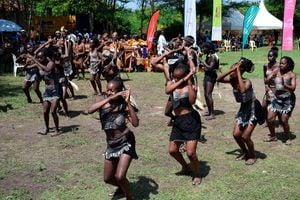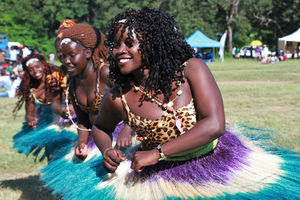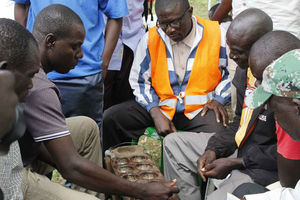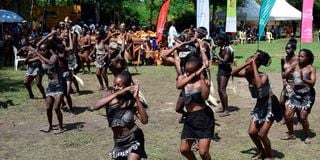
Dancers entertain guests during the Rusinga Cultural Festival at Kamasengre Grounds. The festival is gaining popularity globally and can be used to market the Western Kenya Tourism circuit.
Over Christmas, tourists from at least seven foreign countries visited Homa Bay County during the annual Rusinga Cultural Festival held on Rusinga Island, according to the Kenya Tourism Board (KTB).
The number has increased from the last 12 years since the event was started.
KTB officials now believe the festival is gaining popularity globally and can be used to market the Western Kenya Tourism circuit.
The Rusinga Cultural Festival is the largest annual cultural event in the Lake Region. It is usually held at Kamasengre grounds, a few metres from Tom Mboya Mausoleum.
Participants use it to trace the roots of the Abasuba community, a minority group in Nyanza.
Its main objective is to promote the Abasuba culture and traditions, which are believed to be slowly disappearing due to assimilation into the Luo community.
The organisers of the event believe that bringing the community together once a year and inviting people from outside to see what they do will strengthen the tribe.
Narkiso Okello, the chairman of the Rusinga Cultural Festival organising committee, said mobilising stakeholders from different sectors and joining forces to ensure the future of the Abasuba community was the best way to ensure that its people did not abandon their roots.
"We want upcoming generations to enjoy their culture and speak their language. Every community should have their own identity. We have realised that the majority of the people from the community have forgotten their culture," he said.
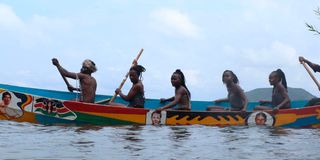
Participants at Rusinga Cultural Festival display how to row a boat in Rusinga Island in Homa Bay County.
The only people who still speak Olusuba (the language used by the Abasuba) are the elders. The younger generation does not speak it. Instead, they speak Dholuo, with some only able to understand basic words in their language.
The event organisers are engaging elders who have not forgotten their way of life to teach the younger generation about their traditional practices.
"The elders have been telling the younger generation about some of the traditional practices of the Suba community. We gain knowledge every year the event is held," Okello said.
Over the years, he said, most of the people in the community have started to embrace their old ways of life, including eating traditional foods.
"We have received requests from other communities, which want to perform at the festival. It helps us understand different cultures as we also showcase our way of life," Okello said.
Suba is considered a marginalised region due to poor road infrastructure and islands in Lake Victoria. This makes movement very difficult.
This year's festival was more vibrant than previous ones because it brought in dancers from Burundi.
There is also a general feeling that it will be more colourful next year as more corporate organisations and individuals, including citizens from other countries, have shown interest in supporting the event.
ICT Cabinet Secretary Eliud Owalo was among the guests who attended this year's festival.
He said some people have lost the fabric of their communities, but with such cultural events, people can trace and strengthen their culture.
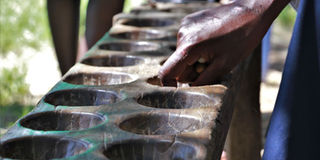
Ajua, the ancient board game, played by a group of elderly men at the 8th edition of the Rusinga Cultural Festival. PHOTO | MESHACK YOBBY
"Most people today have developed an individualistic culture where they do not share. But we all need to work together to grow our cultures," the CS said.
KTB Acting Chief Executive Officer John Chirchir said cultural festivals are an important component of tourism and foreign exchange earners.
He said most festivals bring out what is unique about a community.
In Suba, the festival is used to showcase traditional cuisine, music, fashion, film and literature.
Culture enthusiasts also get a chance to enjoy traditional sports such as wrestling and tug-of-war, which attract huge crowds.
At night, tourists sit around bonfires and listen to stories about the Abasuba culture or watch films.
Also Read: Western Kenya hotels roar back to life
The highlight of the annual event is usually a dance in the water performed by a group of people dressed in animal skins, a traditional cloth used by the community.
The dance goes hand in hand with a canoe race in which fishermen from around Nyanza take part.
Chirchir said more tourists have been visiting Rusinga in recent years because of the activities and other attractions on the island.
"I can confirm that the number of accommodation facilities has increased around the island. It is a testimony that more people are vouching for the island, which has a lot of investment opportunities," he said.
The KTB official said the island and other areas around the lake should be popularised all year round.
Chirchir said the agency would continue to support the cultural festival to promote Abasuba culture and traditions.
"Suba language and culture is threatened by extinction having gone through years of assimilation into the Luo culture. We are, however, seeing young people participating in activities meant to promote their culture, which is encouraging," he said.
The Kenya Airports Authority (KAA), which supported the event, recorded an increase in the number of passengers travelling from Nairobi to South Nyanza for the festival.
"We will continue connecting people through our airports in Kisumu, Kabunde and Migori to visit Rusinga and enjoy the festival," said Peter Wafula, who represented KAA.
Okello said the main challenge threatening the future of the event was the lack of adequate financial support.


